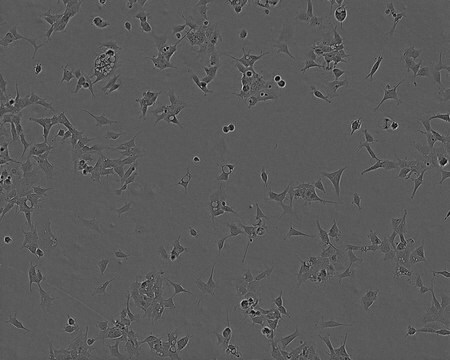P19 Cell Line from mouse
95102107, mouse embryo, Not specified
Sign Into View Organizational & Contract Pricing
All Photos(1)
About This Item
UNSPSC Code:
41106514
Recommended Products
product name
P19 Cell Line from mouse, 95102107
biological source
mouse embryo
description
Mouse teratocarcinoma
growth mode
Adherent
karyotype
Euploid
morphology
Not specified
products
Not specified
receptors
Not specified
technique(s)
cell culture | mammalian: suitable
relevant disease(s)
cancer
shipped in
dry ice
storage temp.
−196°C
Cell Line Origin
Mouse teratocarcinoma
Cell Line Description
The P19 cell line was derived from an embryonal carcinoma induced in a C3H/He strain mouse. The cells can be cloned at high efficiency in medium containing 0.1mM β-mercaptoethanol. The pluripotent P19 cells can be induced to differentiate into neuronal and glial cells in the presence of retinoic acid. Aggregates of P19 cells differentiate into cardiac and skeletal muscle in the presence of dimethyl sulfoxide (DMSO). In the presence of both retinoic acid and DMSO cells develop as if exposed to retinoic acid only.
Application
Differentiation studies
Culture Medium
α MEM + 2mM Glutamine + 1% Non Essential Amino Acids (NEAA) + 2.5% Foetal Bovine Serum (FBS) + 7.5% Calf Serum (CS).
Subculture Routine
Split sub-confluent cultures (70-80%) 1:3 to 1:6 i.e. seeding at 2-4x10,000 cells/cm2 using 0.25% trypsin or trypsin/EDTA; 5% CO2; 37°C.
Other Notes
Additional freight & handling charges may be applicable for Asia-Pacific shipments. Please check with your local Customer Service representative for more information.
Certificates of Analysis (COA)
Search for Certificates of Analysis (COA) by entering the products Lot/Batch Number. Lot and Batch Numbers can be found on a product’s label following the words ‘Lot’ or ‘Batch’.
Already Own This Product?
Find documentation for the products that you have recently purchased in the Document Library.
Our team of scientists has experience in all areas of research including Life Science, Material Science, Chemical Synthesis, Chromatography, Analytical and many others.
Contact Technical Service